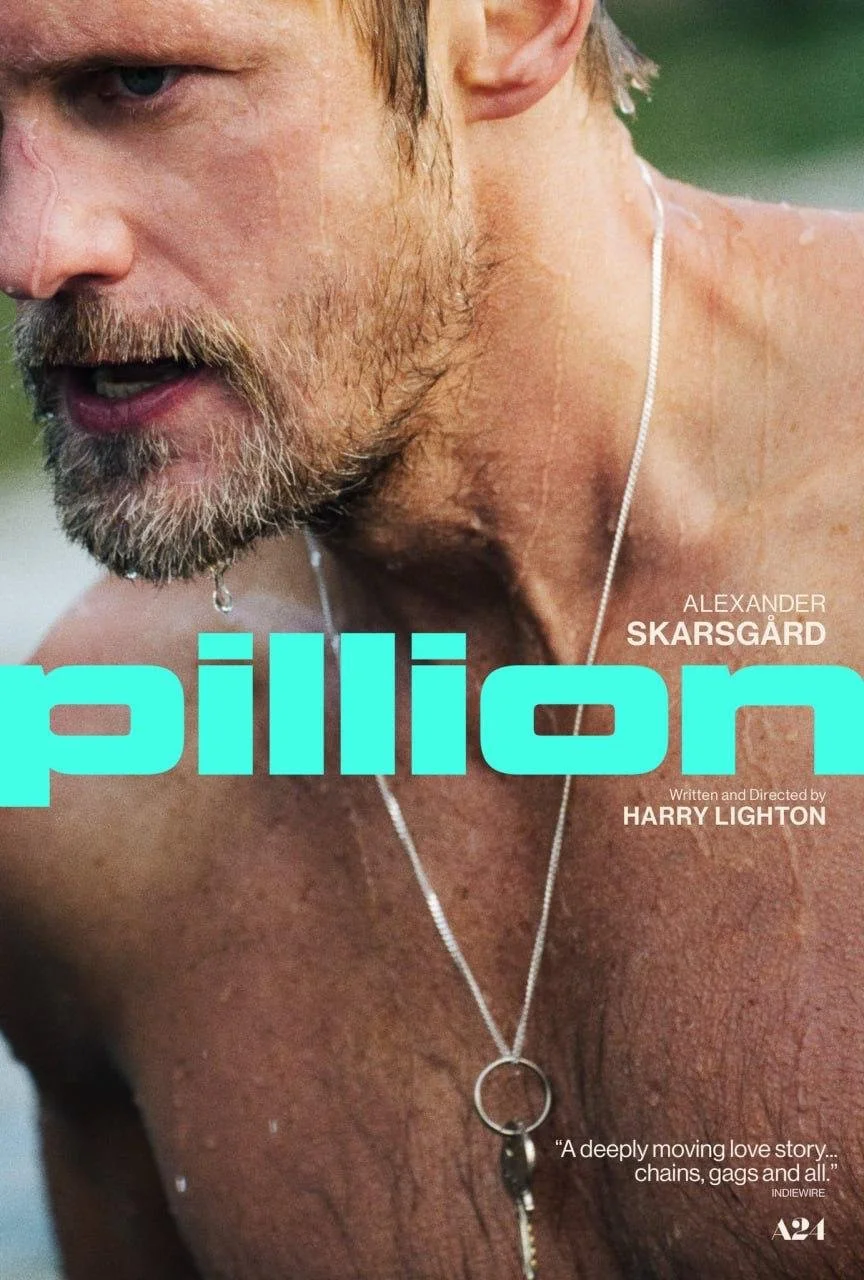Pillion
“Who are you?
Are you in touch with all of your darkest fantasies?
Have you created a life for yourself where you can experience them?
I have
I am fucking crazy
But I am free”.
Have you ever sat in a cinema at 9 a.m. during a prestigious film festival and watched what is essentially BDSM porn for nearly two hours? I have.
Bear with me, because I absolutely have to walk you through the premise of Pillion.
The story follows Colin (played by Harry Melling), a young, utterly unremarkable guy who sings in a bar, lives with his parents, and has no idea what to do with his life. One night, he meets Ray (Alexander Skarsgård), a mysterious biker who likes his leather gear, and later they reconnect in a dark alley for a night of physical intimacy. What seems like a one-off encounter quickly spirals into a full-fledged relationship — or something like it. Here’s the twist: Ray is a dominant, and Colin willingly becomes his submissive, complete with all the explicit, intense, and highly unconventional dynamics that come with that label. And Ray isn’t alone — he’s part of a biker gang where everyone is into the same thing, a whole group built around master/slave dynamics.
Sounds insane, doesn’t it? It did to me too. And knowing the film’s synopsis ahead of time, I braced myself for something potentially awful. But to my surprise, that wasn’t the case with Pillion. Like, at all.
This is the directorial debut of Harry Lighton — yes, a debut — and against all odds, he pulls it off. The film is exactly what it says on the tin: a graphic, sexually charged, frequently absurd piece of cinema filled with nudity, genitals, butts (a lot of butts), sensation play, and scenes that closely resemble hardcore BDSM pornography. But somehow, it works. All of it fits into the narrative and, more importantly, serves a deeper, surprisingly nuanced purpose.
Pillion is a shocker, sure — but beneath its explicit surface lies a delicate, emotionally intelligent study of identity, desire, and self-discovery. It balances shock value with psychological realism in a way that few films manage. This isn’t a story about “bad” relationships just because it’s a gay BDSM drama. No — what makes this relationship toxic is that, in the end, neither participant is happy. And yet, that doesn’t negate its importance.
For Colin, the relationship becomes a stepping stone. He’s inexperienced, uncertain, and green — completely unaware of who he is or what he wants. Entering Ray’s world forces him to confront new truths, unlock his own desires, and begin to understand what truly fulfills him. It’s uncomfortable, often painful, but ultimately crucial for his growth. For Ray, the story is different. He’s an archetype of control — a man who performs cold, distant dominance, only to eventually reveal his vulnerability… and then run from it.
Don’t get me wrong: this film will absolutely be a system shock to the unprepared viewer (do not — I repeat, do not — under any circumstances choose it as a cozy movie night with your family when it’s released digitally). But its exploration of internal longing, sexual identity, and emotional reckoning is surprisingly well-executed. It shows how different people deal with acceptance — whether they lean into it or retreat in fear. Neither path is presented as right or wrong.
The performances are brilliant. Harry Melling brings a sweet, awkward vulnerability to Colin that makes even the wildest moments feel believable. Meanwhile, Alexander Skarsgård portrays Ray as a fortress of stoicism — until he cracks, revealing the fear that lurks beneath all that dominance.
What truly sets Pillion apart, however, is its refusal to take itself too seriously. Lighton, who also wrote the screenplay, weaves moments of comedy and even absurdity into the drama, creating a tone that never tips into pretension. It’s self-aware — and in being so, it works beautifully. Unlike last year’s Babygirl by Halina Reijn, which tackled similar themes but never quite hit the mark, Pillion doesn’t care whether the couple on screen is straight or queer. The emotional core remains the same. This film isn't trying to deliver grand truths or moral lessons — and that’s exactly why it lands.
You walk out of Pillion feeling like you’ve seen something wild, borderline obscene, and perhaps even a little inappropriate… but also something honest. It’s a film that isn’t afraid to go too far — and in doing so, it reveals more about human relationships and personal truth than many so-called “serious” dramas ever manage.
8/10



